In this article:
CVA is a milder form of asthma. Children are more likely than adults to have this type of asthma. This condition is often triggered by exposure to specific allergens and environmental factors or activities such as strong odors, pollen, cold air, exercise, and dust.
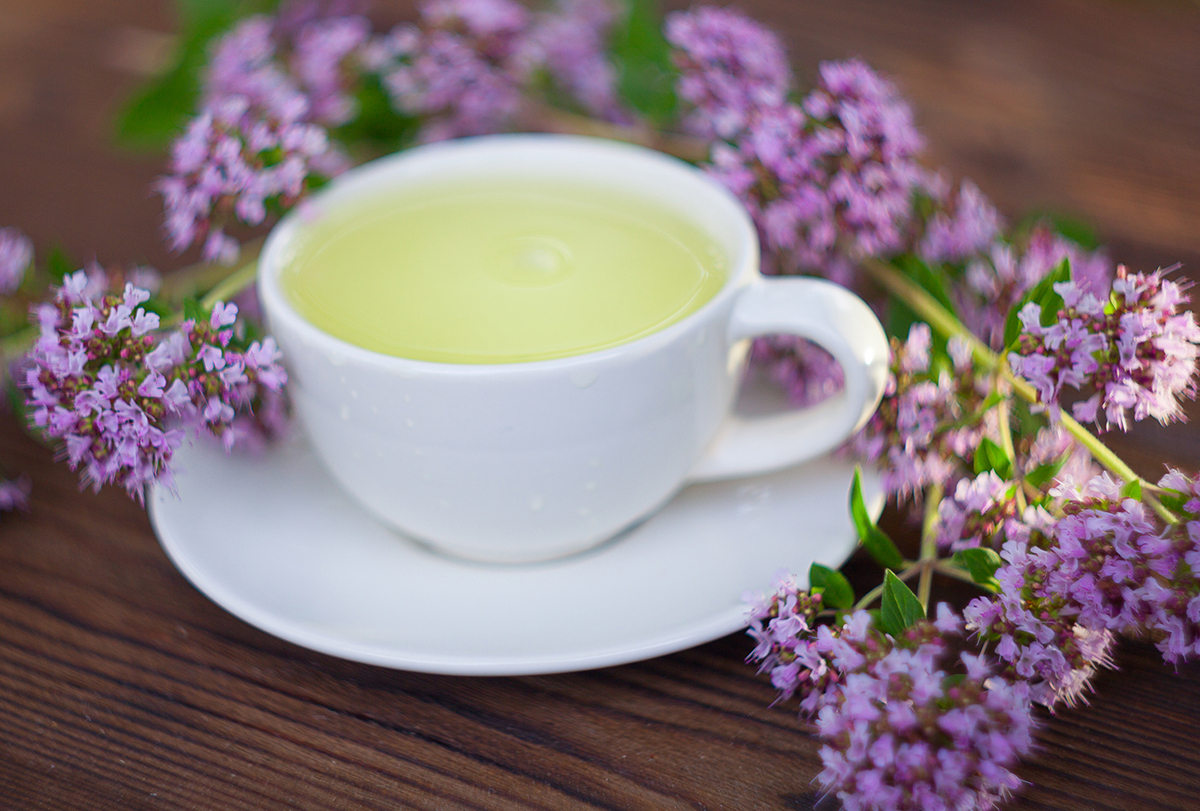
In fact, patients with CVA are also likely to suffer from other allergic conditions, such as drug and food allergies, eczema, and hay fever.
It causes long and frequent spells of dry and unproductive coughing which can lead to sleep disruption, exhaustion, cracked or fractured ribs, vomiting, and light-headedness.
Moreover, the continued strain on your air tubes can cause them to become narrow and swollen, which disrupts the flow of air to and from the lungs. However, the risk of severe airway narrowing is lower with this type of asthma than with regular chronic asthma.
Natural Ways to Relieve Cough Variant Asthma (CVA) Symptoms
Here are the top 10 home remedies for CVA.
1. Gargle with warm salt water
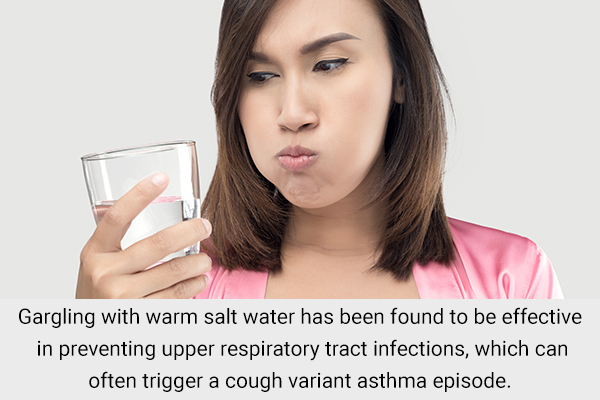
Salt water is a good home remedy for alleviating irritation in the throat, a common by-product of constant coughing. This beneficial effect rests on the principle of homeostasis and osmosis.
The saline solution will suck in the moisture from the inflamed throat and, thereby, bring down the swelling. Moreover, gargling with warm salt water has been found to be effective in preventing upper respiratory tract infections, which can often trigger a CVA episode. (1)
How to do:
- Add 1 teaspoon of salt to 1 cup of warm water.
- Stir until the salt completely dissolves.
- Gargle with this water 2 or 3 times a day.
2. Try oregano tea
Oregano is another effective remedy for a dry cough associated with CVA. This herb contains antispasmodic, antibacterial, and expectorant properties that help clear mucus from the lungs and ease dry coughing. (2)(3)
How to consume:
- Drink 2 to 3 cups of oregano tea daily. To make the tea, steep 3 teaspoons of oregano in 1 cup of hot water for 5 to 10 minutes. Strain it, add honey to taste, and drink it.
- Alternatively, consume 1 tablespoon of juice extracted from fresh oregano leaves a few times a day.
3. A soothing honey drink
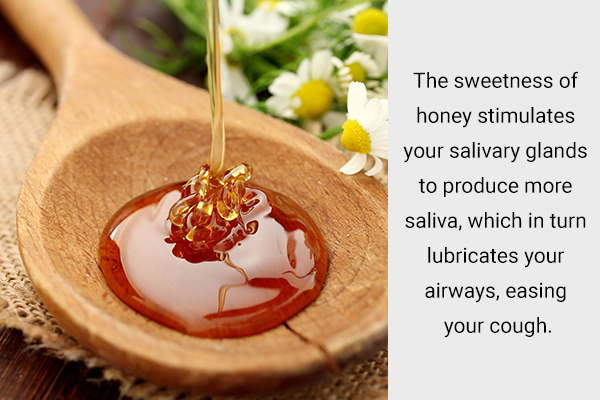
Honey is another very effective natural cure for CVA. The sweetness of honey stimulates your salivary glands to produce more saliva, which in turn lubricates your airways, easing your cough. It also has antioxidant properties that fight inflammation and boost immunity. (4)
As store-bought honey often comes packed with additional taste-enhancing ingredients such as high fructose corn syrup or sugar, it’s best to visit a local health store to get premium-quality unadulterated raw honey.
How to consume:
- Add 1 tablespoon of raw honey to 1 glass of warm water or milk and drink it slowly. Repeat a few times a day. This drink will have a soothing effect on the throat.
- Alternatively, mix equal quantities of honey, ginger juice, and pomegranate juice. Consume 1 tablespoon of this mixture 2 or 3 times a day.
- Before going to bed, consume 1 to 2 teaspoons of raw honey with a little cinnamon powder.
- Add 1 tablespoon of raw honey to 1 glass of warm tea with lemon and drink slowly.
Note: Honey is not recommended for children under the age of 12 months as it might contain spores from the bacterium Clostridium botulinum that can cause infant botulism. (5)
4. Include ginger in your diet
Ginger is a popular natural treatment for various ailments, including asthma and CVA. (6)
Being an excellent expectorant, it can help reduce the intensity and duration of coughing bouts. It also helps reduce airway inflammation and inhibit airway contraction.
Moreover, it has immune-boosting properties that promote quick recovery.
How to consume:
- Cut fresh ginger into small slices and crush them slightly. Put them in a cup of water and bring it to a boil. Drink this 3 or 4 times a day.
- Another option is to chew fresh raw ginger on and off throughout the day.
5. Serve yourself with lemon juice
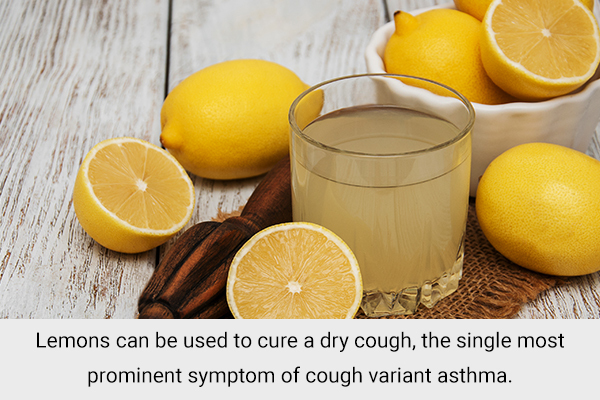
Lemons can also be used to cure a dry cough, the single most prominent symptom of CVA. Lemons have properties that reduce inflammation, and they also provide a dose of infection-fighting vitamin C.
In fact, vitamin C has been proven to be especially useful against common cold-induced asthma. (7) It works by curbing the release of histamines in the body, which in turn prevents excessive allergic reactions and asthma attacks.
How to consume:
- Mix 2 tablespoons of lemon juice with 1 tablespoon of honey. Drink this healthy syrup several times a day.
- Another way to use lemons is to drink hot lemonade a few times a day.
6. Add garlic to your diet
Garlic is also an effective healing agent for the management of CVA. It acts as a natural expectorant, which helps provide quick relief from dry coughing. (8)(9)
Garlic also helps keep the air passages open and reduces the contraction of the airway muscles, which in turn promotes better breathing. Plus, garlic helps bolster your immune system, which is just the thing you need for a speedy recovery.
How to consume:
- Eat a clove of crushed garlic mixed with some honey 2 or 3 times a day.
- Also, add 1 tablespoon of chopped garlic to a pot of boiling water. Cover your head with a towel and inhale the vapor.
Note: Avoid using garlic if you are allergic to it as it may aggravate the symptoms.
7. Have a warm glass of turmeric milk
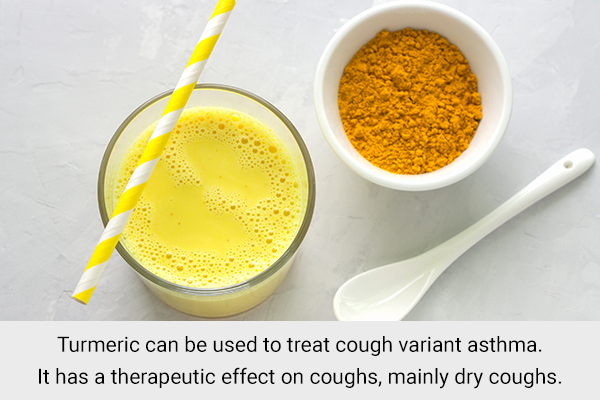
Turmeric can also be used to treat CVA. It has a therapeutic effect on coughs, mainly dry coughs. It also reduces inflammation in the airways, which aids the healing process. Owing to its antiviral, antibacterial, and anti-inflammatory properties, turmeric has been proven to be effective for the treatment of bronchial asthma as well. (10)(11)
Its immune-boosting property also helps your body fight infections.
How to consume:
- Drink a glass of warm milk mixed with ½ teaspoon of turmeric powder twice a day.
- Roast turmeric root and grind it into a smooth powder. Mix 1 tablespoon of raw honey and ½ teaspoon of turmeric powder. Take this twice daily until your condition improves.
- Another option is to drink a glass of warm milk mixed with ½ teaspoon of turmeric powder twice a day.
8. Say no to smoking
Smoking is one of the known triggers for CVA. Smoking or breathing in secondhand smoke irritates your lungs and can worsen coughs. (12) Hence, it is highly recommended that you should quit smoking without delay.
Moreover, you should also make sure that you stay away from environments and situations where you may be subjected to passive smoke.
Start by making your own home a strictly cigarette-free zone by asking your family, friends, and visitors to avoid smoking in your vicinity. Not only will this save you from the secondhand smoke, but this will also help you remain resolute in your decision to stay off cigarettes.
Furthermore, avoid public places that permit smoking and stay at a smoke-free hotel when traveling. This rule does not apply to cigarette smoke alone. You must go a step ahead and try to minimize exposure to smoke that comes from incense, candles, fires, and fireworks.
9. Stay away from pollen and other irritants

A very common trigger for CVA is exposure to pollen. To reduce your coughing, you must pay attention to the air quality reports and avoid highly polluted areas that can worsen your condition. (12)
- Use an air conditioner to reduce airborne pollen from trees, grasses, and weeds that finds its way indoors. Clean and replace your air conditioner filters on a regular basis.
- Keep your windows closed during the pollen season. Also, venture out less often to minimize the risk of exposure.
- Avoid living in a highly polluted area.
- Do your best to keep your house free from dust and dust mites by vacuuming your home twice a week.
- Wash all bedding and stuffed animals frequently with hot water.
- Avoid intense fragrances, which can cause your airways to act up, triggering a coughing spell.
10. Exercise wisely
When suffering from CVA, rigorous or prolonged exercise is not a wise decision. (13) Conversely, resigning yourself to a completely sedentary lifestyle is also not the way to go.
Instead of oscillating between two extremes, its best to take the middle path and incorporate mild-to-moderate workouts or activities. The idea is to get your regular fill of physical exercise without working up your hypersensitive airways.
An appropriate dose of physical activity is just as crucial for people with CVA as for anyone else. In fact, regular exercise can strengthen your immunity and help fight this condition and other diseases in the long run.
Instead of following a vigorous workout plan, try yoga, leisurely biking, moderate-to-brisk walking, swimming, and weight-training workouts.
You can also play sports such as golf, baseball, swimming, gymnastics, tennis, and other racquet sports that involve short and intermittent periods of exertion. Before doing any exercise, start with a warm-up period. Also, exercise inside when the pollen count is high.
How to Prevent Cough Variant Asthma
“Prevention is better than cure” might seem like a cliché, but in the case of CVA, it rings significantly true. In fact, perhaps the best treatment for CVA is to proactively prevent the condition from flaring up in the first place.
To that end, you must swear by your doctor-prescribed medication to stave off coughing episodes and keep your state from worsening.
- It may also be useful to jot down any known or potential triggers and actively avoid exposure to them.
- Keeping your weight in check can also work to take the load of your respiratory responses. Being overweight can worsen asthma symptoms, and it puts you at higher risk of other health problems.
- Try to steer clear of secondhand smoke and other environmental and occupational irritants.
- Be mindful of your personal risk factors.
- Effectively manage your allergies, if you have any.
- Quit or avoid smoking.
- Do breathing exercises to keep your asthma symptoms under control.
- Cover your nose and mouth before going outside when the pollen count is high.
- If you’re allergic to dander, avoid pets with fur or feathers.
- If you have pets, regularly bathe or groom them to reduce the amount of dander in your surroundings.
- Drink enough water to keep your body hydrated.
Additional Tips to Manage Cough Variant Asthma
- Drink warm liquids, such as broth, tea, or juice to soothe your throat.
- Suck on cough drops or hard candies to help ease a dry cough and soothe an irritated throat.
- Cover your nose and mouth whenever you cough or sneeze.
- Follow a diet high in vitamins C and E, beta-carotene, flavonoids, magnesium, selenium, and omega-3 fatty acids.
Final Word
There are many causes for cough and seeking medical attention for a lingering cough can be most beneficial for you to live a more normal life.
Cough variant asthma lasts throughout one’s life. Although symptoms may lessen overtime or the individual may learn to cope with them better, exposure to irritants will always aggravate the coughing. So, identifying and avoiding such triggers is the first step towards avoiding flare-ups.
Treatment for CVA is not difficult if the problem is diagnosed early. Many simple and effective home remedies can provide relief from the CVA-related dry cough and help you get better, faster.

- Was this article helpful?
- YES, THANKS!NOT REALLY



